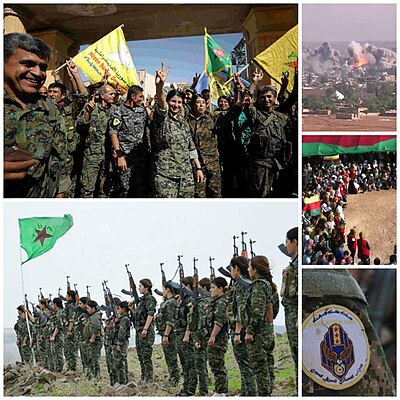| Rojava conflict | |||||||||
|---|---|---|---|---|---|---|---|---|---|
| Part of the Syrian civil war and the Turkish–Kurdish conflict | |||||||||
 Top left: SDF Victory in the Battle for Raqqa (2017). Top right: Coalition airstrike on ISIL position in Kobanî. Middle right: PYD supporters at a funeral. Bottom left: Kurdish YPJ fighters. Bottom right: Syriac Military Council patch. | |||||||||
| |||||||||
| Belligerents | |||||||||
|
|
Syrian opposition |
|
| ||||||
| Units involved | |||||||||
|
Arab tribesmen
|
|
| |||||||
| Casualties and losses | |||||||||
|
|
|
|
| ||||||
| 478 civilians killed by SDF, [13] | |||||||||
The Rojava conflict, also known as the Rojava Revolution, is a political upheaval and military conflict taking place in northern Syria, known among Kurds as Western Kurdistan or Rojava.
During the Syrian civil war that began in 2011, a Kurdish-dominated coalition led by the Democratic Union Party as well as some other Kurdish, Arab, Syriac-Assyrian, and Turkmen groups have sought to establish a new constitution for the de facto autonomous region, while military wings and allied militias have fought to maintain control of the region. This led to the establishment of the Autonomous Administration of North and East Syria (AANES) in 2016.[20]
Supporters of the AANES state that the events constitute a social revolution[21] with a prominent role played by women both on the battlefield and within the newly formed political system, as well as the implementation of democratic confederalism, a form of libertarian socialism that emphasizes decentralization, gender equality and the need for local governance through direct democracy.[6][21]
- ^ "PYD Announces Surprise Interim Government in Syria's Kurdish Reg". Rudaw. Archived from the original on 25 December 2018. Retrieved 24 October 2014.
- ^ "YPG and FSA launch joint military operations against Islamic State in northern Syria". ARA News. 13 September 2014. Archived from the original on 13 September 2014. Retrieved 14 September 2014.
- ^ Anon. "Revolution in Rojava: Democratic Autonomy in Kurdistan". Center for a Stateless Society. Retrieved 23 July 2023.
- ^ Colella, Chris (Winter 2017). "The Rojava Revolution: Oil, Water, and Liberation – Commodities, Conflict, and Cooperation". Commodities, Conflict, and Cooperation. Evergreen State College. Retrieved 23 July 2023.
- ^ Prichard, Alex; Kinna, Ruth; Pinta, Saku; Berry, David, eds. (2017). "Preface". Libertarian Socialism: Politics in Black and Red (2nd ed.). Oakland, CA: PM Press. ISBN 978-1-62963-390-9.
- ^ a b "Rojava, Syria: A revolution of hope and healing". The Vancouver Observer. Retrieved 23 July 2023.
- ^ a b "Al-Qaeda suffered heavy losses against the Kurdish forces". 22 July 2013. Archived from the original on 25 July 2013. Retrieved 24 October 2014.
- ^ "Internationalist Freedom Brigade Established in Rojava". Kurdish Question. 11 June 2015. Archived from the original on 19 July 2015. Retrieved 13 June 2015.
- ^ Moore, Harriet (11 June 2015). "OSINT Summary: Pro-Kurdish foreign fighters group established in Syria". Jane's Terrorism and Security Monitor. Archived from the original on 14 June 2015. Retrieved 13 June 2015.
- ^ a b Haras, Nicholas A. (24 October 2013). "The Battle for Syria's Al-Hasakah Province". Combating Terrorism Center. Archived from the original on 4 March 2016. Retrieved 14 January 2014.
- ^ van Wilgenburg, Wladimir (13 December 2013). "Kurdish Strategy Towards Ethnically-Mixed Areas in the Syrian Conflict". Terrorism Monitor. 11 (23). Jamestown Foundation. Archived from the original on 24 March 2016. Retrieved 14 January 2014.
- ^ Chris Tomson (23 October 2016). "Kurdish forces capture village in northern Aleppo as the Turkish Army redeploys". al-Masdar News. Archived from the original on 3 February 2019. Retrieved 22 November 2023.
- ^ a b "Syrian Revolution 13 years on | Nearly 618,000 persons killed since the onset of the revolution in March 2011". Syrian Observatory for Human Rights. 15 March 2024. Retrieved 15 March 2024.
- ^ a b c "The Syrian Democratic Forces continue to comb the villages and sites to which the pro-Turkish factions advanced on the outskirts of Ain Issa" (in Arabic). Syrian Observatory for Human Rights. 24 November 2019. Retrieved 6 February 2024.
- ^ a b c "On the eve of Nowruz festivals…Afrin witnesses arrests against its residents by the factions of "Olive Branch" on charge of celebrating and setting fire in the festival's anniversary". 6 February 2024. Syrian Observatory for Human Rights. 21 March 2019. Retrieved 6 February 2024.
- ^ "Syria Army, Kurds Push Islamic State Out of Hasakeh City: Report". Archived from the original on 1 August 2015. Retrieved 27 July 2015.
- ^ jack. "13 regime forces killed and wounded in al-Hasakah city". Syrian Observatory For Human Rights. Archived from the original on 25 September 2015. Retrieved 30 July 2015.
- ^ "In one month, International Coalition limits its control to oil fields, and Russia becomes a new player in northern and northeastern Syria". Syrian Observatory for Human Rights. 25 October 2019. Retrieved 6 February 2024.
- ^ "Kurdish forces to keep areas taken from Syrian government forces truce". Reuters. Archived from the original on 11 October 2017. Retrieved 6 February 2024.
- ^ Schmidinger, Thomas. Krieg und Revolution in Syrisch-Kurdistan: Analysen und Stimmen aus Rojava.
- ^ a b Enzinna, Wes (24 November 2015). "A Dream of Secular Utopia in ISIS' Backyard". The New York Times. Archived from the original on 28 November 2015. Retrieved 27 November 2015.
Cite error: There are <ref group=lower-alpha> tags or {{efn}} templates on this page, but the references will not show without a {{reflist|group=lower-alpha}} template or {{notelist}} template (see the help page).